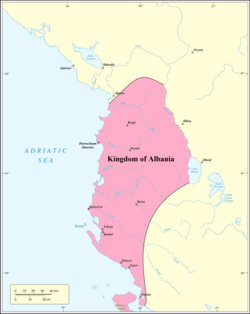Angevin rule in Albania
| Kingdom of Albania | ||||||||||
|
Regnum Albaniae Mbretëria e Arbërisë |
||||||||||
| Dependency of the Angevin Kingdom of Sicily/Naples | ||||||||||
|
||||||||||
|
Kingdom of Albania at its maximum extent
|
||||||||||
| Capital | Durazzo (Dyrrhachium, modern Durrës) | |||||||||
| Religion | Catholicism, Eastern Orthodoxy | |||||||||
| Government | Monarchy | |||||||||
| King, Lord and later Duke | ||||||||||
| • | 1272–1285 | Charles I | ||||||||
| • | 1366–1368 | Louis | ||||||||
| Historical era | Medieval | |||||||||
| • | Established | 1272 | ||||||||
| • | Disestablished | 1368 | ||||||||
|
||||||||||
The Kingdom of Albania (Albanian: Mbretëria e Arbërisë, Latin: Regnum Albaniae) was established by Charles of Anjou in the Albanian territories he conquered from the Byzantine Empire in 1271. The Kingdom of Albania was declared in late February 1272. The kingdom extended from the region of Durazzo (Dyrrhachium, modern Durrës) south along the coast to Butrint. A major attempt to advance further in direction of Constantinople failed at the Siege of Berat (1280–1281). A Byzantine counteroffensive soon ensued, which drove the Angevins out of the interior by 1281. The Sicilian Vespers further weakened the position of Charles, and the Kingdom was soon reduced by the Byzantines to a small area around Durazzo. The Angevins held out here, however, until 1368, when the city was captured by Karl Thopia. In 1392 Karl Thopia's son surrendered the city and his domains to the Republic of Venice.
During the conflict between the Despotate of Epirus and the Empire of Nicaea in 1253, lord Golem of Kruja was initially allied with Epirus. Golem's troops had occupied the Kostur area trying to prevent the Nicaean forces of John Vatatzes from entering Devoll. Vatatzes managed to convince Golem to switch sides and a new treaty was signed between the parties where Vatatzes promised to guarantee Golem's autonomy. The same year Despot of Epirus Michael II signed a peace treaty with Nicaea acknowledging their authority over west Macedonia and Albania. The fortress of Krujë was surrendered to Nicaea, while the Nicean emperor acknowledged the old privileges and also granted new ones. The same privileges were confirmed later by his successor Theodore II Laskaris.
...
Wikipedia


